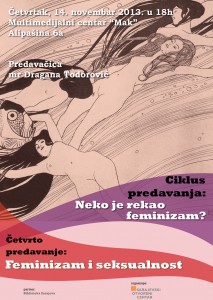 On Thursday November 14th 2013, SOC will sponsor the fourth lecture in the series “Somebody Said Feminism?” in Multimedia Center Mak, Alipasina 6a. This series focuses on feminist themes, the rights of women, and questions of gender. The fourth one will be taught by Dragana Todorovic from Novi Sad, who through her words will bring us closer to these themes. The lecture starts at 18:00; it’s open to the public and free.
On Thursday November 14th 2013, SOC will sponsor the fourth lecture in the series “Somebody Said Feminism?” in Multimedia Center Mak, Alipasina 6a. This series focuses on feminist themes, the rights of women, and questions of gender. The fourth one will be taught by Dragana Todorovic from Novi Sad, who through her words will bring us closer to these themes. The lecture starts at 18:00; it’s open to the public and free.
The interweaving of sexuality and gender, the significance of this relationship for feminism, and the consideration of how sexuality has become a political question for feminism, as well as how the feminist orientations that have arisen from this discussion will be the basic theme of this lecture.
Although sexuality as a theme has been present since the very beginning of thought, in the past few hundred years it has become one of the central places where theory and practice meet while searching for explanations for various phenomena. In different socio-historical periods and cultures, sexuality is perceived and explained in different ways, with varying consequences and stimulated by a variety of needs. From philosophy to medicine, through art, politics, and economics, many fields were (and still are) interested in the question of sexuality. While the study of sexuality was mostly initiated via instrumental methods, where sexuality was most often the means by which greater goals were supported or thwarted, it has become one of the most complex and mystified ideas that is very difficult to explain in its isolated curiosities.
However, these ventures were needed in order for sexuality to become denaturalized and uncovered as a social construct par excellence. Furthermore, the modes and motives on which sexuality is instrumentalized must be further deconstructed.
Dragana Todorović was born in 1980 in Novi Sad. She works for Labris Lesbian Human Rights Organization in Belgrade in the office of lobbying and public advocacy. She studied politics and international relations and got her master’s in gender studies at the Gender Studies Department at the Central European University in Budapest. Now she is working on a doctorate in the same field. Professionally, she is focused on public policy and gender mainstreaming as well as questions on gender relations and sexuality, and gender and rural development. She has published many works and translations within these fields, and has participated in numerous scientific and activist conferences. She has worked in the public and private spheres, in the country and internationally. She is a vegetarian and from Vojvodina.